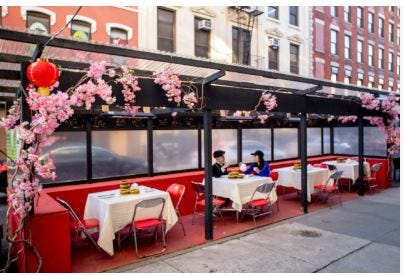A strange encounter
It was a warm, almost Summer-like night in New York. It happens every October and people enjoy it tremendously. Like many I decided to go out to a restaurant for a dinner, thinking that the next time when I would be able to sit outdoors would be in six months or more. I walked down the 9th Avenue to one of the restaurants I like. But it was full. Everybody was outside and happy to enjoy the Indian summer. The owner, who knew me, is a very nice, friendly guy and he, as I quickly realized, saw that there was no free outdoor table. I was just by myself; no place to sit. But he gestured me toward a table that had three men, apparently speaking Russian. He asked them if they would not mind if I joined them. They were very kind and agreed immediately. “No problem”, they said. So, I sat with them.
We ordered different Italian dishes and wine and loosely pretended to have a general conversation about the weather and housing costs for a while. But when the desserts came I, inspired by the evening and the friendliness of the owner who treated us to extra glasses of wine, said to the guy who sat next to me: “Dear Lev, Mr Bronshtein, I think that one should not nationalize small-scale restaurants like this one. You have seen how friendly the owner is; even the workers who are hired laborers seemed very happy. They were smiling; they brought us the wine and we had a very nice chat with them. I think that it would be wrong to nationalize places like this”. My unlikely dinner companion turned to me, slightly lowered his glasses or readjusted his gaze (I was not sure which one), and looking at me with his piercing eyes as if he wanted to draw a sword through my body said: “I have heard so many times this petty bourgeois babble that I cannot stand it anymore. We fought against it, but apparently with no success. As you might know, I was not part of the majority in London but I have come to realize that everybody else talking similar nonsense like yours is letting this huge opportunity to make a fundamental and world-historic transformation lost. If we let small-scale enterprises grow, they will morph into medium-scale enterprises, and the medium-scale enterprises will grow into big-scale enterprises, and therefore the dominant mode production will no longer be socialist but capitalist. And the question will be asked, why did we have the revolution whose ultimate result is the same system which preceded the revolution?”.
Taken aback by the intensity of his speech and the strength of the answer, I turned, in desperation, to the fellow who sat directly across from me and who until then was rather quiet. Comrade Djugashvili said the following: “I do happen to agree with comrade Bronshtein in this particular case although our agreement is phenomenological in the sense that we simply agree superficially even if the reasons for the agreement are entirely different. Comrade Bronshtein has, as always, presented an exaggeratedly economistic view of things. The reality is that such small-scale capitalist enterprises, if we do not nationalize them, will grow to bigger scale enterprises and the bigger scale enterprises will grow to an even bigger size and the people who run them will have money and will corrupt our cadres and will, directly or indirectly, become the political leaders. And you would not be sitting here tonight talking to us but you will be speaking to the people like Kerensky and Prince Lvov and they would laugh at us for being so naïve to let them come back to power.”
I thought I had definitely lost my case by 2-0. But then the third, a bald fellow with a small barbiche, joined in: “I disagree with the comments made by comrades Bronshtein and Djugashvili. We should let small scale enterprises prosper and flourish. Yes, they would grow larger, and our nice owner here might run a whole chain of such-like restaurants, and turn out not be such a nice fellow anymore. But we shall create larger enterprises which enjoy economies of scale, and they would expand even faster than these restaurants. Moreover, we shall keep the political power strongly in our hands, eliminate the corrupt cadres, and never let owners like our tonight’s friend come close to power. And such countries, developing both from below (like this restaurant) and from above (directed by us and using economies of scale), will overtake capitalist countries and we shall be proven to be a superior mode of production as argued in the scientific literature we all know well. I understand that the Chinese comrades have recently taken that approach and they seem to be doing well. So, I do agree that we should not nationalize this Italian restaurant in New York nor any other similar restaurants and enterprises in the world but for the reasons that are not the same as mentioned by our Serbian [he forgot my name] comrade.”
I was very relieved and pleased. I looked around and I wanted to thank the last speaker, Mr. Ulianov, as he introduced himself, when suddenly my cell phone rang. I looked at it and it was the Maestro calling. So I turned to my dinner companions to thank them, and I bid them farewell. They very kindly said goodbye to me. And I looked back at the three of them and wished them well.


Really enjoyed your Kafkaesque dream.
Your younger readers may not be able to identify the dramatis personae.
Did Lenin really foreshadow Deng Xiao-ping’s thinking? The NEP suggests possibly so, but I don’t know enough about Lenin’s thinking in his last few years to know about this